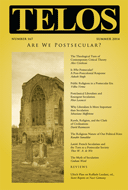 Critical theory inherited classical accounts of social change that linked modernization processes to secularization: in order for societies to overcome traditionalist structures and pursue the accelerated development of modernity, they would have to escape the grip of religion. This is perhaps most famously the case for Marx, who, in the introduction to his Critique of Hegel’s Philosophy of Right, declared religion “the opium of the people,” blocking the way of progress: “The abolition of religion as the illusory happiness of the people is the demand for their real happiness. To call on them to give up their illusions about their condition is to call on them to give up a condition that requires illusions. The criticism of religion is, therefore, in embryo, the criticism of that vale of tears of which religion is the halo.” To surmount a social condition that produces unhappiness requires renouncing the systematic concealing of that condition which is, so Marx, the genuine function of religion, the ultimate paradigm of ideology as false consciousness.
Critical theory inherited classical accounts of social change that linked modernization processes to secularization: in order for societies to overcome traditionalist structures and pursue the accelerated development of modernity, they would have to escape the grip of religion. This is perhaps most famously the case for Marx, who, in the introduction to his Critique of Hegel’s Philosophy of Right, declared religion “the opium of the people,” blocking the way of progress: “The abolition of religion as the illusory happiness of the people is the demand for their real happiness. To call on them to give up their illusions about their condition is to call on them to give up a condition that requires illusions. The criticism of religion is, therefore, in embryo, the criticism of that vale of tears of which religion is the halo.” To surmount a social condition that produces unhappiness requires renouncing the systematic concealing of that condition which is, so Marx, the genuine function of religion, the ultimate paradigm of ideology as false consciousness.
|
In this short video introduction, Telos editor Russell A. Berman discusses the themes and concerns of Telos 167 (Summer 2014): Are We Postsecular? You can read Russell’s full introduction here, and the issue itself is available for purchase in our online store. |
||||
|
Telos Press Publishing · PO Box 811 · Candor, NY 13743 · Phone: 212-228-6479 Privacy Policy · Data Protection Copyright © 2025 Telos Press Publishing · All Rights Reserved |
||||


